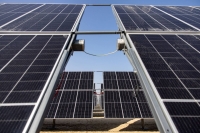Saudi Arabia has for years invested in China’s fossil fuels industry, cementing ties with one of the biggest customers for its massive oil exports.
Now Beijing is repaying in kind. China’s clean energy firms are looking to the Middle Eastern kingdom to globalize their manufacturing bases as firms come under unprecedented margin pressure at home and trade tensions worsen with the U.S. and its allies.
Saudi Arabia offers benefits including low-cost electricity, good relations with a wide variety of countries and a location central to Europe, Asia and Africa, said Sean Wang, executive president of international operations for TCL Zhonghuan Renewable Energy Technology, which is building a 20-gigawatt solar wafer factory in the kingdom.
"You can’t rely on a 'Make in China and service the world' model anymore,” he said Tuesday at an investment forum. "Saudi has really become the most convenient place because of its good relationship with both the East and the West.”
TCL was joined by firms including wind turbine maker Envision Energy and battery supplier Ganfeng Lithium Group in lauding Riyadh at the China-Saudi Investment Conference in Beijing, the centerpiece of a six-day tour of the country by Saudi minister Khalid Al-Falih. More than 60 agreements, worth a potential $25 billion and spanning sectors from energy to tourism and health care, were signed at the gathering, according to the investment ministry that Al-Falih leads.
The visit comes at an inflection point for China’s renewables sector, where excess capacity is driving profits into the ground.
After spending more than a decade building up supply chains to deliver the low-cost solar panels, wind turbines and electric vehicle batteries needed for the global energy transition, Chinese firms have increasingly found themselves beset by tariffs and other trade barriers as rivals try to protect their domestic industries and copy their success.
At the same time, deepening relations with Chinese firms serves the Saudi goal of developing its economy beyond oil as it ponders the world’s retreat from its biggest source of revenue. Investment from China could help the kingdom become a big player in the clean power many hope will one day replace fossil fuels. And it would also expand Beijing’s clout in a region that will remain crucial to its energy security for many years to come.
The Saudi government offers the promise of more policy certainty in a world where China is increasingly a political target for other countries, said Roy Zhang, Ganfeng Lithium’s investment director. Still, the country could draw more Chinese investment by allowing companies to bring in more of their own people, he said.
Envision, one of China’s largest wind manufacturers, recently delivered its first batch of turbines to the world’s largest green hydrogen project in Neom, the futuristic city being built on the kingdom’s northwest coast.
"Saudi Arabia has some of the richest renewable power sources,” said Yu Feng, Envision’s global vice president. "Wind, solar and green hydrogen will become a very important fundamental energy sector in Saudi Arabia and will provide new energy to the global market.”
Riyadh is also interested in tapping Chinese mining expertise as it accelerates efforts to excavate the Arabian peninsula for metals that will be key to the energy transition, said Khalid Alsharief, vice president for strategy and business development at state-owned miner Ma’aden.

















With your current subscription plan you can comment on stories. However, before writing your first comment, please create a display name in the Profile section of your subscriber account page.